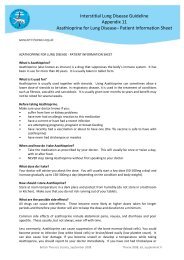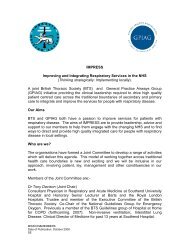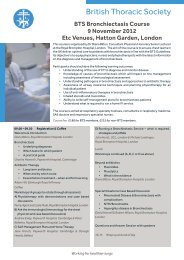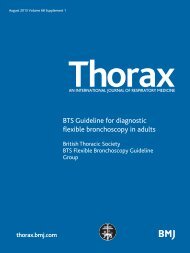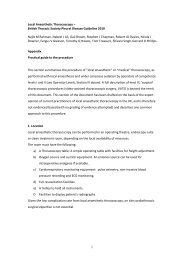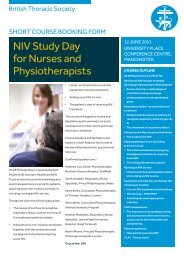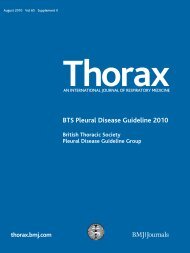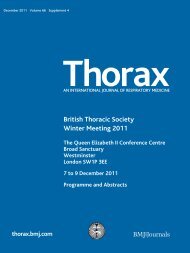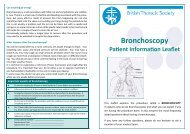Guidelines for the management of community ... - Brit Thoracic
Guidelines for the management of community ... - Brit Thoracic
Guidelines for the management of community ... - Brit Thoracic
Create successful ePaper yourself
Turn your PDF publications into a flip-book with our unique Google optimized e-Paper software.
BTS guidelines<br />
4–5 years largely, has a low mortality rate and affects younger<br />
persons. A policy <strong>for</strong> initial empirical <strong>the</strong>rapy that aimed to<br />
always cover this pathogen was considered inappropriate.<br />
For <strong>the</strong>se reasons, as well as <strong>the</strong> issues <strong>of</strong> current practice,<br />
cost, wide experience and drug tolerance, amoxicillin remains<br />
<strong>the</strong> preferred agent. The alternative agents <strong>for</strong> those intolerant<br />
<strong>of</strong> amoxicillin are doxycycline and <strong>the</strong> macrolides clarithromycin<br />
and erythromycin. 277 [Ib] Recommendation <strong>of</strong> a tetracycline<br />
as an alternative <strong>the</strong>rapy has been adopted on <strong>the</strong> basis <strong>of</strong> lower<br />
resistance rates among pneumococci (fig 9) and activity against<br />
atypical pathogens. Reduced gastrointestinal intolerance and an<br />
easier dosing schedule are <strong>the</strong> major reasons <strong>for</strong> recommending<br />
clarithromycin over erythromycin. Concern over <strong>the</strong> rising<br />
frequency <strong>of</strong> in vitro resistance (fig 9) <strong>of</strong> S pneumoniae to<br />
macrolides (which is <strong>of</strong>ten linked to penicillin resistance) is<br />
recognised, yet published clinical evidence <strong>for</strong> clinical failure <strong>of</strong><br />
macrolides in <strong>the</strong> treatment <strong>of</strong> pneumococcal pneumonia<br />
remains limited 454 [III] 455 456 457 [IVa] [IVa]<br />
and controversial.<br />
The macrolides clarithromycin and azithromycin 458 [IVa] and<br />
<strong>the</strong> fluoroquinolones 459 [IVa] have microbiological strengths in<br />
vitro, yet in published studies to date have not been shown to<br />
be more efficacious than standard <strong>the</strong>rapy in treating patients<br />
with low severity CAP. Several meta-analyses (including a<br />
Cochrane review) <strong>of</strong> trials that have compared empirical<br />
antibiotic regimens with atypical pathogen coverage with<br />
regimens without atypical pathogen coverage in patients with<br />
low severity pneumonia have not found any benefit <strong>of</strong> regimens<br />
with atypical pathogen coverage in terms <strong>of</strong> survival or clinical<br />
efficacy. 460–462<br />
The association <strong>of</strong> H influenzae and, to a much lesser extent,<br />
M catarrhalis with acute exacerbations <strong>of</strong> COPD is recognised. 463<br />
[II]<br />
However, both remain uncommon causes <strong>of</strong> CAP. When CAP<br />
does arise with <strong>the</strong>se pathogens, an even smaller percentage <strong>of</strong><br />
such patients will be infected with b-lactamase producing<br />
strains. To illustrate <strong>the</strong> clinical significance <strong>of</strong> such resistance<br />
<strong>for</strong> managing CAP, it could be estimated that 5% <strong>of</strong> CAP cases<br />
may be caused by H influenzae, <strong>of</strong> which 15% may be b-<br />
lactamase producing strains in <strong>the</strong> UK. There<strong>for</strong>e, <strong>of</strong> 500<br />
patients with CAP, only 4 may be infected with such antibioticresistant<br />
strains.<br />
A view that specific pathogens are associated with o<strong>the</strong>r<br />
comorbid diseases (eg, H influenzae and COPD) to increase <strong>the</strong><br />
risk <strong>of</strong> CAP is not supported by <strong>the</strong> literature. For <strong>the</strong>se reasons,<br />
<strong>the</strong>se guidelines do not <strong>of</strong>fer alternative regimens <strong>for</strong> patients<br />
with or without comorbid illness, while recognising that such<br />
diseases can affect <strong>the</strong> severity <strong>of</strong> CAP in an individual.<br />
The current concern over <strong>the</strong> increasing prevalence <strong>of</strong><br />
pneumococci with reduced susceptibility to penicillin is<br />
recognised. However, <strong>the</strong> incidence <strong>of</strong> highly resistant strains<br />
(MIC >4 mg/l) remains uncommon in <strong>the</strong> UK. Fur<strong>the</strong>rmore,<br />
<strong>the</strong> rarity <strong>of</strong> documented clinical failures among penicillinresistant<br />
pneumococcal pneumonia, if treated with adequate<br />
doses <strong>of</strong> penicillin, is <strong>the</strong> basis <strong>for</strong> endorsing oral amoxicillin as<br />
first-line <strong>the</strong>rapy at a dosage <strong>of</strong> 500 mg three times daily.<br />
Recommendations<br />
c For patients treated in <strong>the</strong> <strong>community</strong>, amoxicillin<br />
remains <strong>the</strong> preferred agent at a dose <strong>of</strong> 500 mg three<br />
times daily. [A+]<br />
c Ei<strong>the</strong>r doxycycline [D] or clarithromycin [A2] are<br />
appropriate as an alternative choice, and <strong>for</strong> those<br />
patients who are hypersensitive to penicillins.<br />
Thorax 2009;64(Suppl III):iii1–iii55. doi:10.1136/thx.2009.121434<br />
c<br />
Those with features <strong>of</strong> moderate or high severity<br />
infection should be admitted urgently to hospital. [C]<br />
8.8 Should general practitioners administer antibiotics prior to<br />
hospital transfer in those patients who need admission?<br />
There is no direct evidence upon which to provide clear<br />
guidance on this question. There is, however, some circumstantial<br />
evidence to suggest that early antibiotics are <strong>of</strong> benefit<br />
in high severity pneumonia.<br />
Delay in prescribing antibiotics <strong>for</strong> patients in hospital with<br />
464 465<br />
diagnosed pneumonia is associated with a worse outcome<br />
[III] [III]<br />
and, in patients dying from CAP, <strong>the</strong> majority had not<br />
received prior antibiotics even though most had visited a general<br />
practitioner in <strong>the</strong> previous few days. In a national confidential<br />
enquiry into CAP deaths in young adults in England and Wales,<br />
20 <strong>of</strong> <strong>the</strong> 27 fatal cases investigated had seen <strong>the</strong>ir general<br />
practitioner <strong>for</strong> <strong>the</strong> illness and only 9 had received antibiotics. 466<br />
[II]<br />
In <strong>the</strong> multicentre BTS study <strong>of</strong> CAP in 1982, none <strong>of</strong> <strong>the</strong><br />
patients who died from pneumococcal pneumonia had received<br />
an antibiotic be<strong>for</strong>e admission. The authors concluded that<br />
some deaths may have been preventable and recommended that<br />
an antibiotic active against S pneumoniae should be started as<br />
soon as pneumonia is recognised. 6 [Ib] In a study from New<br />
Zealand, significantly fewer (p = 0.05) <strong>of</strong> those who died had<br />
received antibiotics be<strong>for</strong>e admission (20%) compared with<br />
those who survived (42%). 467 [Ib] Currently, less than half <strong>of</strong><br />
adults admitted to hospital in <strong>the</strong> UK with high severity CAP<br />
have already received antibiotics from <strong>the</strong>ir general practitioner.<br />
[III] [III] Many deaths and requirements <strong>for</strong> assisted<br />
42 103<br />
ventilation occur in <strong>the</strong> first few days <strong>of</strong> admission <strong>for</strong> high<br />
severity CAP. 6 37 241 [Ib] [Ib] [Ib] All <strong>of</strong> <strong>the</strong>se studies provide fur<strong>the</strong>r<br />
support to <strong>the</strong> suggestion that, in cases <strong>of</strong> diagnosed pneumonia,<br />
antibiotics should be given as early as possible, if necessary<br />
be<strong>for</strong>e hospital admission.<br />
Delays do occur between general practitioner assessment in<br />
<strong>the</strong> <strong>community</strong>, arranging admission, confirmation <strong>of</strong> <strong>the</strong><br />
diagnosis in hospital and <strong>the</strong> start <strong>of</strong> treatment. Probably <strong>the</strong>se<br />
are inevitable and will be exacerbated by transport distances and<br />
ambulance availability and prioritisation, bed availability and<br />
triage in <strong>the</strong> medical assessment unit or emergency department.<br />
Delays between admission and receiving antibiotics <strong>of</strong> .6 h<br />
have been reported <strong>for</strong> younger adults dying in hospital <strong>of</strong> CAP<br />
(average delay 260 min), 284 [III] although this study was<br />
conducted be<strong>for</strong>e medical assessment units were introduced<br />
into most UK hospitals.<br />
From time to time, general practitioners do see patients who<br />
are severely ill with what appears to be pneumonia. In such<br />
circumstances, treatment should commence as soon as possible,<br />
providing it does not delay transfer to hospital. When general<br />
practitioners feel treatment in such circumstances is needed, it<br />
should aim to cover pneumococcal pneumonia—<strong>the</strong> commonest<br />
cause <strong>of</strong> high severity CAP—with intravenous penicillin G<br />
1.2 g or oral amoxicillin 1 g orally (or clarithromycin 500 mg in<br />
patients with penicillin sensitivity). General practitioners are<br />
likely to carry such antibiotics with <strong>the</strong>m as parenteral<br />
penicillin is recommended as <strong>the</strong> immediate treatment <strong>for</strong><br />
suspected meningococcal infection. Ambulance services should<br />
allocate to patients with pneumonia a high priority <strong>for</strong> transfer<br />
to hospital.<br />
Prescribing antibiotics does have an influence on some<br />
microbiological investigations. 6 [Ib] However, when general<br />
practitioners feel a patient is severely ill or circumstances suggest<br />
that delays in transfer will slow assessment and treatment in<br />
iii35




